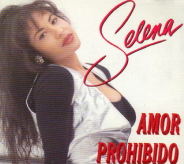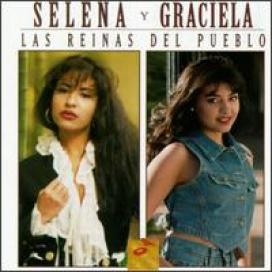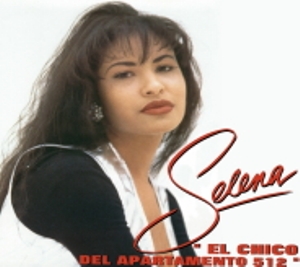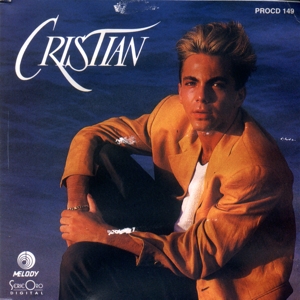
Selena Quintanilla Pérez was an American singer. Referred to as the "Queen of Tejano Music", her contributions to music and fashion made her one of the most celebrated Mexican-American entertainers of the late 20th century. In 2020, Billboard magazine put her in third place on their list of "Greatest Latino Artists of All Time", based on both Latin albums and Latin songs chart. Media outlets called her the "Tejano Madonna" for her clothing choices. She also ranks among the most influential Latin artists of all time and is credited for catapulting the Tejano genre into the mainstream market.

Amor Prohibido is the fourth studio album by American singer Selena, released on March 22, 1994, by EMI Latin. Having reached a core fan base, the label aimed to broaden her appeal with the next studio release. Finding it challenging to write a follow-up hit after "Como la Flor" (1992), Selena's brother A. B. Quintanilla enlisted the assistance from band members Ricky Vela and Pete Astudillo with writing the album's songs. The resulting album has a more mature sound featuring experimental production that blends diverse musical styles from ranchera to hip-hop music. Amor Prohibido is a Tejano cumbia album modernized with a synthesizer-rich delivery using a minimalist style that was quintessential in early 1990s Tejano music.

American singer Selena released eleven studio albums, three live albums, three boxsets, three remix albums, two soundtrack albums, and twenty compilation albums. Credited for elevating a music genre into the mainstream market, Selena remains the best-selling Tejano recording artist in history, selling over 18 million records worldwide. She was named the top-selling Latin artist of the 1990s decade in the US by Billboard magazine.

All My Hits: Todos Mis Éxitos is a greatest hits album by American singer Selena. It was released posthumously on March 9, 1999, through EMI Latin to commemorate its ten-year anniversary since entering the music industry. The album coincided with the fourth anniversary of Selena's death, though then-president Jose Behar rebuffed the idea that the album was an exploitive ploy by the company. Following Selena's death on March 31, 1995, Abraham Quintanilla expressed his interest in preserving his daughter's memory through her works. Selena's family has been criticized by fans and the media for exploiting the singer and cannibalizing her murder by commercializing her repertoire. According to the singer's brother, A.B. Quintanilla, one of Selena's wishes was for her to "never go away", citing a conversation he shared with Selena and their sister Suzette Quintanilla, that if anything were to happen to any one of them, their wish would be to continue on with their music.

All My Hits: Todos Mis Éxitos Vol. 2 is a greatest hits album by American singer Selena that was released on February 29, 2000, through EMI Latin. After Selena's murder in 1995, her father Abraham Quintanilla stated his commitment to preserving her music and EMI Latin pledged ongoing support for her releases. In 1999, the label's president José Behar acknowledged Selena, who remained the label's top-selling artist, for her contributions to establishing EMI Latin as "the house that Selena built". In March 1999, to commemorate the label's tenth anniversary, it released All My Hits: Todos Mis Éxitos; it achieved commercial success and a sequel was announced. All My Hits: Todos Mis Éxitos Vol. 2 contains 16 songs ranging from tracks featured on Selena's Muñequito de Trapo (1987) to the posthumous 1997 club remix of "Enamorada de Ti" (1990).

Ones is a compilation album by American singer Selena, released in the United States on October 1, 2002 by EMI Latin. It was released on November 11, 2002 in Spanish-speaking countries, while the limited edition included a bonus DVD of her music videos. Ones was released building on the popularity of the 1997 biographical film Selena. The album was aimed at Selena's new generation of fans, and its release marked the singer's twentieth year in the music industry. Ones features six number one singles namely, "Amor Prohibido", "Bidi Bidi Bom Bom", "No Me Queda Más", "Fotos y Recuerdos", and her duets with Álvaro Torres on "Buenos Amigos" and the Barrio Boyzz on "Donde Quiera Que Estés".

"No Me Queda Más" is a song by American singer Selena on her fourth studio album, Amor Prohibido. It was released as the third single from the album in October 1994 by EMI Latin. "No Me Queda Más" was written by Ricky Vela, and production was handled by Selena's brother A.B. Quintanilla. A downtempo mariachi and pop ballad, "No Me Queda Más" portrays the ranchera storyline of a woman in agony after the end of a relationship. Its lyrics express an unrequited love, the singer wishing the best for her former lover and his new partner.

"Bidi Bidi Bom Bom" is a song recorded by American Tejano singer Selena. It was released as the second single from her fourth studio album, Amor Prohibido (1994). Originally written about a cheerful fish swimming freely in the ocean, the song's title is an onomatopoeic phrase suggesting the palpitating heartbeat of a person lovestruck by the object of their affection. "Bidi Bidi Bom Bom" was written by Selena and her backup vocalist and dancer Pete Astudillo.

"Techno Cumbia" is a song recorded by American singer Selena for her fourth studio album, Amor Prohibido (1994). It was posthumously released as the b-side track to "Dreaming of You" through EMI Latin on August 14, 1995. Techno Cumbia would be put on her fifth and final studio album Dreaming of You (1995) and would be the fourth single for Dreaming Of You. "Techno Cumbia" was written by Pete Astudillo and co-written and produced by Selena's brother-producer A.B. Quintanilla. The song is a dance-pop and tecnocumbia recording with influences of dancehall, rap, Latin dance, and club music. Lyrically, Selena calls on people to dance her new style the "techno cumbia" and calls out those who cannot dance.

"Amor Prohibido" is the title song of American Tejano singer Selena's fourth studio album of the same name (1994). Released as the lead single through EMI Latin on April 13, 1994, it was written by Selena, her brother and music producer A.B. Quintanilla III, and her band's backup vocalist Pete Astudillo. A popular interpretation compares it to Romeo and Juliet.

Las Reinas del Pueblo is a compilation album by American Tejano music singer Selena and Mexican banda singer Graciela Beltrán. It was released on April 4, 1995, by EMI Latin in the wake of Selena's death on March 31, 1995. The decision to produce a compilation album featuring Beltrán emerged after her tribute to the singer at a Houston memorial. The title was inspired by Mexican newspapers that referred to Selena as "an artist of the people" during a 1992 press tour in the nation and subsequently dubbed her "La Reina del Pueblo" in the aftermath of her death. Las Reinas del Pueblo encompasses six tracks by Selena and six by Beltrán, encapsulating their respective tenures with EMI Latin. Las Reinas del Pueblo peaked at number four on the US Billboard Top Latin Albums and Regional Mexican Albums chart, both behind other Selena releases. The recording peaked at number 147 on the American Billboard 200 chart. The album peaked at number ten on the Spanish albums chart in 2010. Beltrán's participation in the album yielded substantial promotional and sales enhancements.

"Buenos Amigos" is a down-tempo, pop ballad duet recorded by Salvadoran recording artist Álvaro Torres and American recording artist Selena for Torres' sixth studio album Nada Se Compara Contigo (1991). The song was released by EMI Latin in 1992, as the album's second single. Its lyrics explore a friendship built on the strong, unrequited feelings of the male narrator. Torres composed "Buenos Amigos" after attending a showcase event at which Selena was performing.

"El Chico del Apartamento 512" is a song recorded by American recording artist Selena for her fourth studio album, Amor Prohibido (1994). It was released along with "Fotos y Recuerdos" in January 1995, serving as its B-side track. Written by Ricky Vela, "El Chico del Apartamento 512" is a cumbia song with influences of Colombian and South American music. Lyrically, the song describes a female protagonist who knocks on her love interest's apartment door and is heartbroken when his sister answers it. Justino Aguilar of Billboard magazine, called "El Chico del Apartamento 512" as one of Selena's "most memorable songs". The track posthumously peaked at number one on the U.S. Billboard Regional Mexican Digital Songs chart in 2011.

"Nunca Voy a Olvidarte" is a song written by Roberto Belester and first recorded by Mexican grupero band Bronco for their album Salvaje y Tierno (1991). In the song, the protagonist is leaving and vows to never forget the time he spent with his lover. In 1993, Mexican singer-songwriter Cristian Castro covered the song on his album, Un Segundo en el Tiempo. Castro's version peaked at number-one on the Billboard Hot Latin Songs chart in the United States became his first number-one single.
American singer Selena released twenty-four official singles, seven promotional singles. Her career began as the lead vocalist of Los Dinos in 1980. Her albums with Los Dinos on indie labels failed to achieve any chart success. In 1987, her remake of Ritchie Valens' "La Bamba" peaked at number 19 on the United States Billboard Hot Latin Songs chart, her first entry. She signed with EMI Latin nine years later as a solo artist though her band continued to tour with her. Selena appeared on "Buenos Amigos" with Salvadoran singer Álvaro Torres. The track peaked at number one on the U.S. Hot Latin Songs chart in 1991, the singer's first number one song. Subsequent singles, "Baila Esta Cumbia" and "Como la Flor", became popular songs on Mexican radio, with "Como la Flor" launching the singer's career in that country. "Como la Flor" peaked at number six on the Hot Latin Songs chart, despite popular culture claims that it was the singer's first number one single. The track has charted on the U.S. Regional Mexican Digital Songs list since its inception in 2010 and remains the singer's signature number and most popular recording.

The Barrio Boyzz were an American Latin pop group. The group was made up of Puerto Ricans who grew up in New York City. They gained popularity during the 1990s, when they became label-mates with Selena then landed their first Billboard number-one song entitled "Donde Quiera Que Estés" in 1993, from the album of the same name.

Enamorada de Ti is the second remix album by American Tejano singer Selena. It was released posthumously on 3 April 2012 through Capitol Latin and Q-Productions. Enamorada de Ti was produced by Sergio Lopes, Leslie Ahrens, Andres Castro, Moggie Canazio, Cesar Lemons and Chilean record producer Humberto Gatica. Gatica had the idea of modernizing songs recorded by Selena into today's popular music genres. Selena's family had already been working on a similar idea, but they set it aside in favor of Enamorada de Ti, which had gained the approval of Capitol Latin. The selection of artists to sing duets with Selena began in late summer 2011. Gatica and Selena's family chose American singer and actress Selena Gomez, Puerto Rican singer Don Omar, Samuel "Samo" Parra from the Mexican rock band Camila, Mexican singer Cristian Castro, Spanish DJ mixer Juan Magan, and the Carlos Santana band, while the remaining songs selected were remixed.

"Mañana, Mañana" is a song written by Mexican singer-songwriter Juan Gabriel. Argentine singer Libertad Lamarque performed the song in the Mexican movie La loca de los milagros. Juan Gabriel released his recording of the song, a duet with Estela Nuñez, on his album Ella (1979). The song describes the departure of a lost love who will never return.

Lo Mejor de...Selena is a double disc compilation album by American singer Selena. It was released posthumously in the United States on March 31, 2015, by Capitol Latin and Universal Music Latin Entertainment. The album was released after the commercial and chart success of Enamorada de Ti (2012), which featured several Latin music acts lending their voices for the remix album. The recording features six number one United States Billboard Hot Latin Songs chart singles by the singer—"Buenos Amigos", "Donde Quiera Que Estés", "Amor Prohibido", "Bidi Bidi Bom Bom", "No Me Queda Más", "Fotos y Recuerdos", and the US Billboard Latin Pop Airplay chart single "I Could Fall in Love".

















